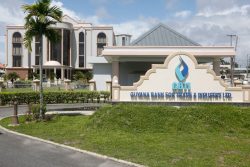Business drivers are tied to public policies in many ways. We constantly talk about reviving our nation’s economy, why we have so little foreign investment and why there is still so much poverty in our nation while smaller nations around us seem to thrive. Many of us have talked about creating a Tiger economy, such as building the road to Brazil to the deep water harbour.
Guyana is the size of Great Britain which has over 60 million people, and also the size of North and South Korea put together with over 25 million people. How then do we develop such a large landmass with less than 750,000 people? We cannot, no matter how much better we do things.
If we first solve our energy issue and transfer our focus from sugar production to ethanol and hydro power, we will automatically open up our large area for major development. Selling a few acres here and there for $5.00 will not make any major difference to our economy. The main reason the hydro power project is not getting off the ground is that the government is asking the investors to sell back electricity at US7c a kilowatt when we are currently paying somewhere in the vicinity of 28c. Our government needs to learn how to negotiate with large investors, understand return on investments, and set in motion the right indicators that will bring about large economic changes in our nation.
I have written in the past that a key component of getting it (our economy) right is our immigration policy. What are the steps necessary to ensure we attract the right investments while also importing the skill sets that we need to create stability in our job market? A gap analysis must be completed for any new industry with skills we can maintain in Guyana and those we will need to import. Many will ask “why do we need to import skills and open up our borders to immigrants?” This compounds a dual problem we face; stopping our limited skilled workers migrating while attracting additional skilled workers for specific targeted investments. Increased immigration would bring advantages in the form of the high net contribution that highly-qualified immigrants would make to the economy as a whole.
They would not be economically dependant for long periods as in the case with those born and raised in Guyana, and savings would also be made on the costs of education. The experience of other countries indicates that economic migrants are far less likely to be a drain on the welfare system than those from the native population.
Immigration without the right tax laws, the right focus on industries that will turn us into a tiger economy will have no value. I propose that we present legislation to our 9th Parliament on what our immigration policy will look like as we simultaneously create an integrated economic plan to improve the wealth of our population. We cannot continue to manage in stove pipes, where policy does not meet reality and ministries function on their own without integration and measurements to an economic plan.
This year alone, 2.8 million new Brazilians will be born and a projected population of 207 million by 2020. Many will be searching for greener pastures if there is stagnation in the Brazilian economy. The issue facing the Brazilian economy is a bottleneck in the logistics sector as a whole which becomes a cash cow for us given our strategic location.
Our minimum agenda in order to take the path to development. must include four structural adjustments, a) infrastructure improvements, b) adopting a trade policy that will increase exports in a sustainable fashion, c) fiscal and tax reforms to reduce the tax burden the productive sector currently bears and d) an immigration policy that improves our workforce while maintaining our local skills.
We have to adopt a tax policy that encourages, not hinders, economic growth and productive activities. One of the reasons that we must ensure we build an integrated economic plan is that none of this can work well without other components, such as security, investing in electricity generation and the development of public -private – partnerships (P3). Until next week. Roop







